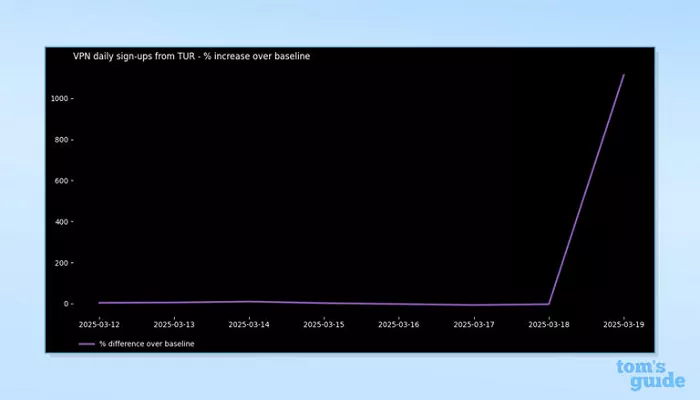VPN usage in Turkey has surged following reports of social media restrictions and the arrest of Istanbul Mayor Ekrem Imamoglu, a key political rival of President Recep Tayyip Erdogan.
Proton VPN, a leading virtual private network provider, reported a 1,100% increase in sign-ups—well above its usual baseline—according to data from the Proton VPN Observatory.
Social Media Blocked Across Turkey
On March 19, 2025, internet watchdog NetBlocks confirmed that multiple Turkish internet service providers (ISPs) restricted access to major social media platforms, including YouTube, Instagram, TikTok, and X (formerly Twitter).
“Live metrics show #Turkey has restricted access to multiple social media platforms, including X, YouTube, Instagram, and TikTok,” NetBlocks stated on X. “The incident comes as Istanbul Mayor Ekrem Imamoglu and dozens of others are detained in events described by the opposition as a ‘coup.'”
Reports indicated that some users were unable to access these platforms entirely. Those who could connect experienced significant disruptions, including slow loading times on X and YouTube. Instagram users struggled to load profiles and stories.
A Pattern of Internet Censorship
This is not the first time Turkey has seen a dramatic rise in VPN usage due to online restrictions. Proton VPN data shows similar spikes in response to past censorship efforts:
- October 2024: A 1,400% increase in sign-ups followed a widespread social media block.
- August 2024: VPN usage jumped by 4,500% after Instagram was blocked.
- May 2023: Fear of internet censorship ahead of the presidential election led to a 2,100% rise in Proton VPN sign-ups.
- February 2023: The largest recorded increase—15,000%—occurred after Turkey temporarily blocked Twitter in the wake of a devastating earthquake.
Since taking office in 2014, President Erdogan has faced criticism for restricting digital freedoms. Many opponents have labeled his leadership “authoritarian” due to repeated crackdowns on internet access.
Crackdown on Digital Freedoms Intensifies
Turkey has frequently disrupted internet services as part of broader efforts to control information. Surfshark’s Internet Shutdown Tracker reports that since 2015, Turkey has implemented 17 internet disruptions—making it the fourth-highest offender in Asia.
Protests broke out following Imamoglu’s arrest, prompting Turkish authorities to detain 37 people for allegedly sharing “provocative” content on social media. This move further raised concerns over increasing government control of digital platforms and the erosion of online privacy rights.
As restrictions continue, many Turkish citizens are turning to VPNs to bypass censorship and maintain access to information.

